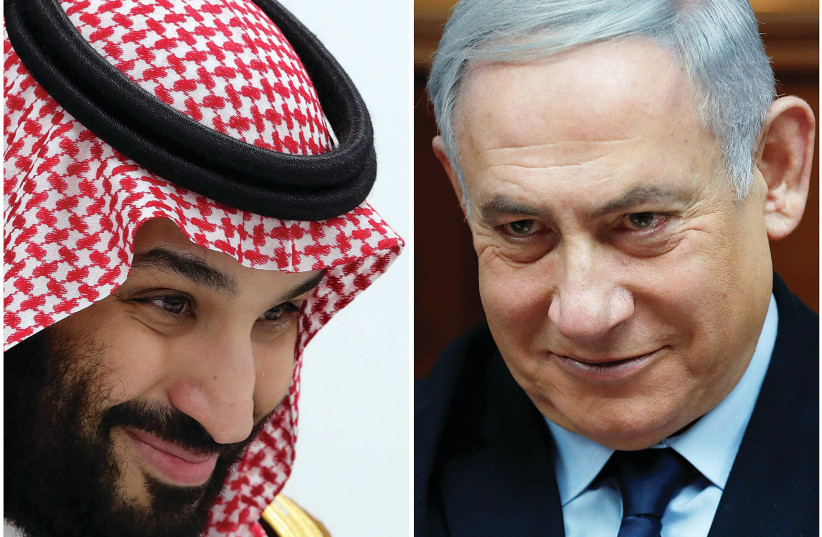Iran’s embassy in Saudi Arabia reopened last week for the first time in seven years after the two regional rivals reestablished bilateral ties. At the same time, Saudi officials arrived in Iran to discuss procedures for reopening the kingdom’s embassy in Tehran.
Iran and Saudi Arabia agreed to end their diplomatic rift and reopen their missions last month in a deal brokered by China. How will the rapprochement between Tehran and Riyadh affect Jerusalem, and how should Israel respond to what appears to be a game-changer in the Middle East?
On the one hand, Saudi Arabia’s decision to move closer to Iran rather than Israel is of real concern. The Biden Administration has been pushing for normalization between Saudi Arabia and Israel for some time, and Prime Minister Benjamin Netanyahu stated clearly in his inaugural speech three months ago that his main foreign policy objective is to broaden the 2020 Abraham Accords and reach an agreement with Riyadh, while halting Iran’s nuclear program – which both Israel and Saudi Arabia strongly oppose.
On the other hand, both Israeli and US officials have said that the Saudi-Iran deal could help Israel’s efforts to normalize relations with Riyadh. An Israeli official said that if the deal leads to the end of the war in Yemen, relations between Saudi Arabia and the US would improve and this would make it easier for Washington to work on promoting normalization between Saudi Arabia and Israel. A US official said that from Washington’s point of view, there is no reason why the Saudi-Iranian deal would hamper this process.
Maj.-Gen. (ret.) Amos Yadlin, a former head of the IDF Military Intelligence Directorate, told Breaking Defense: “The Saudis want to get something from Washington before they make a normalization move towards Israel – like a civilian nuclear program. The way to Jerusalem goes through Washington.”

According to Yadlin, Sunni Saudi Arabia and Shi’ite Iran will remain enemies on religious, ideological and strategic levels, and it is not at all clear that they will be able to bridge the hostility between them within two months, as their agreement stipulates.
For example, he argued, “It is doubtful whether Iran will be able to fulfill its commitment and force the Houthis, who are acting relatively independently, to completely cease attacks against Saudi Arabia from Yemeni territory.”
As the Post’s Seth Frantzman pointed out, the reason why the Saudi-Iranian deal was initially portrayed as a setback for Israel is that just days before it was announced, there had been reports in The Wall Street Journal and The New York Times that Saudi Arabia had presented conditions for normalizing ties with Israel – including security guarantees from the US.
Saudi-Iran deal reduces chances of nuclear arms race
Frantzman argued that although the Saudi-Iranian deal might pave the way for relations between Riyadh and Syria, which would worry Israel, it could also lead to Iran scaling down its nuclear program, which would be a welcome development. “Saudi Arabia will not want to sign a deal and then suddenly have Iran develop a bomb that threatens the region,” he wrote. “Clearly, regional stability means not having a nuclear-armed Iran or a nuclear arms race.”
Jerusalem and Riyadh have maintained clandestine contacts over establishing relations and Netanyahu said after meeting with US National Security Adviser Jake Sullivan in January that they had discussed “the next steps to deepen the Abraham Accords and widen the circle of peace, with an emphasis on a breakthrough with Saudi Arabia.”
No Israeli officials have gone on record about the resumption of relations between Saudi Arabia and Iran, or the fact that it was a diplomatic victory for China in a region in which the US has historically played the dominant role. Still, the hope in Jerusalem is that, as in the case of the United Arab Emirates, Saudi Arabia’s detente with Iran will not prevent it from forging relations with Israel in the near future. Perhaps it will even expedite the process.
Regardless, now is not the time for Israel to take a wait-and-see approach, but rather to engage with both the US and – through appropriate channels – Saudi Arabia and explore how the window of opportunity for normalization can be maintained and eventually seized.
